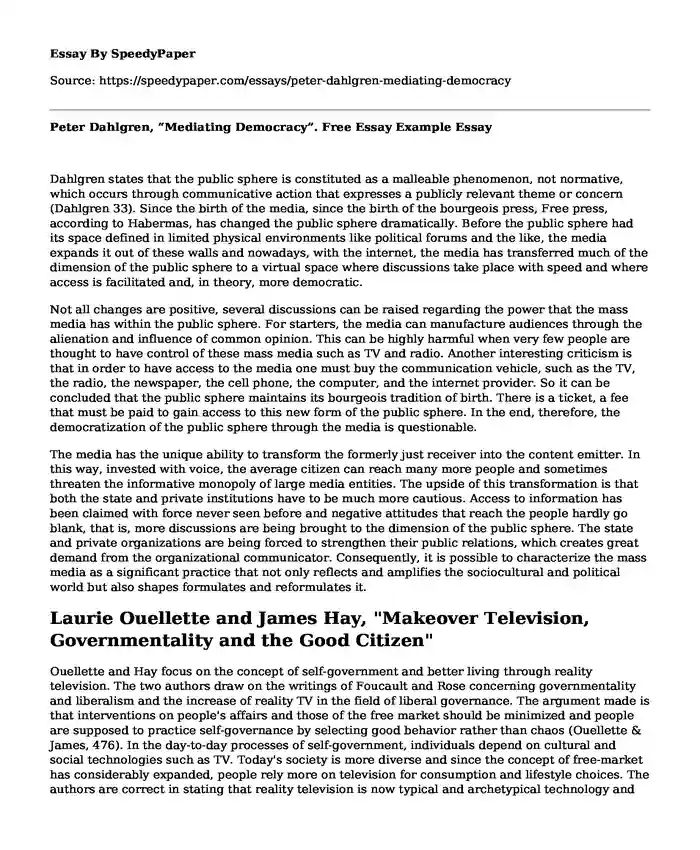
| Type of paper: | Essay |
| Categories: | Democracy Media Social issue |
| Pages: | 3 |
| Wordcount: | 782 words |
Dahlgren states that the public sphere is constituted as a malleable phenomenon, not normative, which occurs through communicative action that expresses a publicly relevant theme or concern (Dahlgren 33). Since the birth of the media, since the birth of the bourgeois press, Free press, according to Habermas, has changed the public sphere dramatically. Before the public sphere had its space defined in limited physical environments like political forums and the like, the media expands it out of these walls and nowadays, with the internet, the media has transferred much of the dimension of the public sphere to a virtual space where discussions take place with speed and where access is facilitated and, in theory, more democratic.
Not all changes are positive, several discussions can be raised regarding the power that the mass media has within the public sphere. For starters, the media can manufacture audiences through the alienation and influence of common opinion. This can be highly harmful when very few people are thought to have control of these mass media such as TV and radio. Another interesting criticism is that in order to have access to the media one must buy the communication vehicle, such as the TV, the radio, the newspaper, the cell phone, the computer, and the internet provider. So it can be concluded that the public sphere maintains its bourgeois tradition of birth. There is a ticket, a fee that must be paid to gain access to this new form of the public sphere. In the end, therefore, the democratization of the public sphere through the media is questionable.
The media has the unique ability to transform the formerly just receiver into the content emitter. In this way, invested with voice, the average citizen can reach many more people and sometimes threaten the informative monopoly of large media entities. The upside of this transformation is that both the state and private institutions have to be much more cautious. Access to information has been claimed with force never seen before and negative attitudes that reach the people hardly go blank, that is, more discussions are being brought to the dimension of the public sphere. The state and private organizations are being forced to strengthen their public relations, which creates great demand from the organizational communicator. Consequently, it is possible to characterize the mass media as a significant practice that not only reflects and amplifies the sociocultural and political world but also shapes formulates and reformulates it.
Laurie Ouellette and James Hay, "Makeover Television, Governmentality and the Good Citizen"
Ouellette and Hay focus on the concept of self-government and better living through reality television. The two authors draw on the writings of Foucault and Rose concerning governmentality and liberalism and the increase of reality TV in the field of liberal governance. The argument made is that interventions on people's affairs and those of the free market should be minimized and people are supposed to practice self-governance by selecting good behavior rather than chaos (Ouellette & James, 476). In the day-to-day processes of self-government, individuals depend on cultural and social technologies such as TV. Today's society is more diverse and since the concept of free-market has considerably expanded, people rely more on television for consumption and lifestyle choices. The authors are correct in stating that reality television is now typical and archetypical technology and shape the decisions that so many people make daily.
In current times, the governing of liberal capitalist democracies is propagated through consumer choice, individual responsibility, and privatization. As such, reality television depicts how individuals and people ought to behave and conduct themselves as law-abiding and enterprising citizens. The authors do a spending job in demonstrating how the use of reality TV in neoliberal governance provides ways through which the power of TV can be conceptualized. They do this through the illustration of extensive arguments on the different strands of reality television. A micro-perspective of Charity TV (programs that help people turn their lives around, for example, Extreme Makeover, Miracle Workers and Random one) indicates that television is still serving the public and how such programs align with the post-welfare politics of former President Bush. A deeper analysis of life intervention programs has been done (for example, Judge Judy, How Clean is your House, and Supernanny) and how they promote self-governing through learning. In general, it is a well-detailed and highly informative piece with factual information and many examples. It is also an interesting read and shows how life can be enhanced and improved through reality TV.
Works Cited
Dahlgren, Peter. Television and the public sphere: Citizenship, democracy, and the media. Vol. 10. Sage, 1995.
Ouellette, Laurie, and James Hay. "Makeover television, governmentality, and the good citizen." Continuum 22.4 (2008): 471-484. https://doi.org/10.1080/10304310801982930
Cite this page
Peter Dahlgren, "Mediating Democracy". Free Essay Example. (2023, Jan 31). Retrieved from https://speedypaper.com/essays/peter-dahlgren-mediating-democracy
Request Removal
If you are the original author of this essay and no longer wish to have it published on the SpeedyPaper website, please click below to request its removal:
- Essay Sample on Duties towards Compatriots and Non-Compatriots
- Free Essay with a Biology Graduate School Personal Statement Sample
- School Environment Makes Difference in School Education, Essay Example
- Essay Example: Sri Lanka as the Socialist Republic
- HR Essay Sample: Training Evaluation Writing Assignment
- Self-Reflective Writing on Teamwork - Free Paper for Everyone
- Free Essay Example - Future Search Meeting
Popular categories




